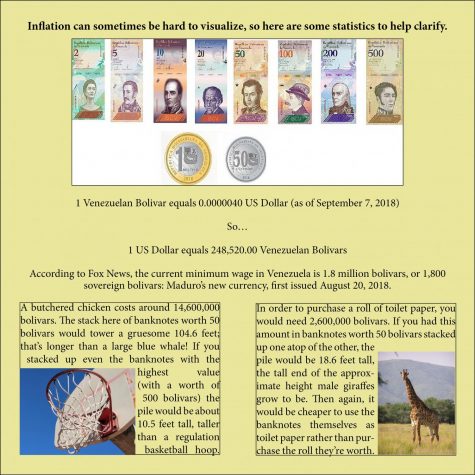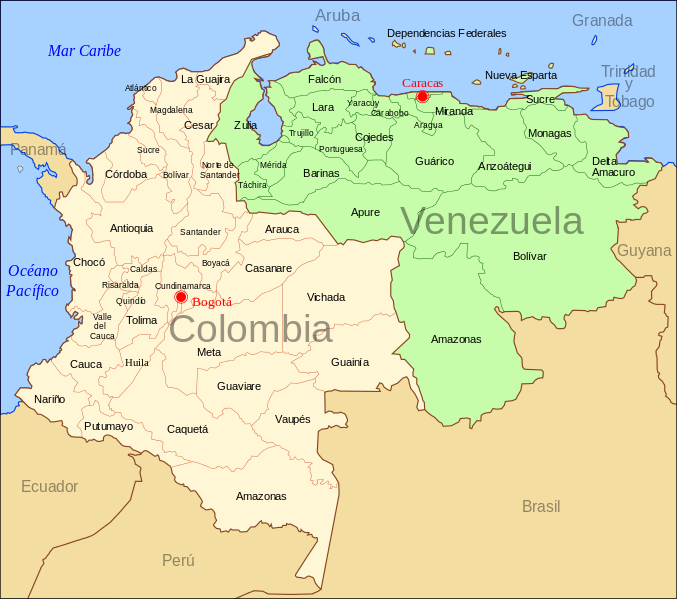Photo courtesy of Wikimedia Commons
Poverty flourishes as Venezuelan economic crisis continues
POSTED September 25, 2018
Hungry people stand in line to purchase spoiled meat to feed their families. Power outages have become the norm; running water, a luxury. Welcome to Venezuela. Once a rich democracy, this country has experienced a bit of a change of pace in the past couple decades as socialist dictators have taken over. Poverty now flourishes, and individuals try hard to stay afloat in this tumultuous economy.
HOW BAD ARE THINGS… TRULY?
Jobs are scarce as businesses must lay off employees in order to pay their bills, and as a result, a handful of Venezuelan women have turned to prostitution in Columbia so they can feed their families. Alex Crawford, special correspondent for Sky News, interviewed several Venezuelan women stuck in this very position. One such woman had been a ballerina and business women before the collapse. She stated: “This is a shameful job but what option do I have? … I have to make money to look after my children and feed them. There is nothing in Venezuela. The only way to put food on the table for my children is to travel here to Colombia and sell my body.” Many more women had similar viewpoints; Crawford noted that cumulatively, “The women spoke of feeling powerless and vulnerable and admit their options are extremely limited, with no official paperwork to leave Venezuela legally in the long-term.”
Jobs, however, are not the only things experiencing a shortage; food is in high demand and hard to get ahold of. Fox News reports that people wait in lines to purchase spoiled meat for their families, as they have no other choices for nutrition. When asked about the meat, one butcher remarked “Of course they eat the meat — thanks to Maduro… The food of the poor is rotten food.”
 Some are hard-pressed to purchase even rotten food. The Miami Herald interviewed a group of young kids who hunt for their meals each day, eating things like slugs, parrots, lizards and crabs: whatever they can find. Many have resorted to eating cats, dogs, horses, anteaters and flamingos. The lattermost, native to parts of Venezuela, have been labeled illegal to hunt, yet hunger has become no match for regulation in regards to these birds. The remains of these animals and more can be found strewn in the streets and city dumps.
Some are hard-pressed to purchase even rotten food. The Miami Herald interviewed a group of young kids who hunt for their meals each day, eating things like slugs, parrots, lizards and crabs: whatever they can find. Many have resorted to eating cats, dogs, horses, anteaters and flamingos. The lattermost, native to parts of Venezuela, have been labeled illegal to hunt, yet hunger has become no match for regulation in regards to these birds. The remains of these animals and more can be found strewn in the streets and city dumps.
Scarce and rotten food can only lead to one thing: weight loss. One article from Reuters announced that Venezuelans “reported losing on average 11 kilograms (24 lbs) in body weight” during 2017. This weightloss was involuntary, meaning there was no widespread exercise movement that swept Venezuela; the country was simply starving. Diets here range from poor to horrendous as the people struggle to feed themselves.
WHAT HAPPENED?
Crazy levels of inflation obviously didn’t just show up overnight, so how exactly did the economy get so bad?
Part of the problem came with Hugo Chavez, a socialist. Chavez, president from 1999 to 2013, not only created a country that lived in fear (as those who protested against him were “disperse[d]… often lethally,” according to the Independent), but also set up the finances of Venezuela to one day fail. As oil prices rose after 1998 (Venezuela is known for its oil exports), this “allowed the socialist regime to increase both spending and borrowing,” wrote Garth Friesen of Forbes. Edmundo Bracho, lecturer at the University of Westminster, stated that during years of prosperity saving money “was ‘never a part of the government’s policies.’” “Instead, it accumulated massive debts and financed ideological allies, such as Cuba and Bolivia, without doing elementary maths.” The socialist leader also tried to curb the country’s dependence on other nations’ products by restricting imports, and nationalizing other industries, however his plans would eventually backfire, Friesen reported.
Chavez, however, was not the only one who dug Venezuela into the economic hole it sits in today. Nicolas Maduro, the country’s leader since April of 2013, hasn’t exactly been much help. The Economist notes that Maduro admitted to boosting the hyperinflation by printing money in an attempt to “finance the budget deficit.”
Maduro, desperate for change, began implementing a new plan to try to improve the economic state of the country. This proposal “features a new currency that lops five zeros off the nearly worthless bolivar, a sharp increase in the price of fuel and a rise in the minimum wage of more than 3,000%,” reported The Economist.
The change in currency value created turmoil that affected vendors and consumers alike. Maduro, just a few weeks ago, put into place a reform that would supposedly make everything better. He called a national holiday on Monday, August 20, in order for shopkeepers to update their prices and employee wages. Yet, as simple as Maduro may have made this sound, the message was not very straightforward to the people. The New York Times mentions one such buyer, a woman looking to purchase shoes for her granddaughter, as being perplexed by the conversion even after using an app designed to help with this. If individuals cannot figure out how to convert to the new currency how are they supposed to make purchases and keep the economy moving forward?
Businesses, already struggling from the lack of customers, have also been told that the minimum wage has been increased substantially, and this is not the first time. Minimum wage has been raised many, many times since 2016, yet the economy does not appear to be getting better. Many employers are faced with the decision of either letting workers go or being forced to close their doors because they simply do not have the means to stay open otherwise.
To summarize, the socialist methods of Chavez, Maduro and the PSUV (United Socialist Party of Venezuela) failed in Venezuela. The people here are now starving, have little clean water available, are jobless and experience frequent power outages. On socialism, Maduro himself addressed the PSUV in July of 2018, saying, “The production models we’ve tried so far have failed, and the responsibility is ours — mine and yours.”
